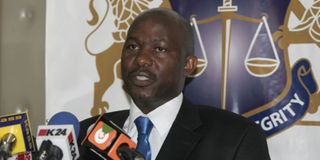Why Kibaki camp was uncomfortable with Omogeni at helm of graft body

Photo/FILE
Mr Omogeni, who is the chair of the commission’s advisory board, emerged top in the interviews followed by Mr Mumo Matemu and Dr Sarah Kilemi.
Flashback to January 2008. Probably one of the darkest moments in Kenya’s post-independence history.
The country has been pushed to the edge after ODM rejected presidential election results which handed victory to President Kibaki against Orange Democratic Movement leader Raila Odinga.
The President is hurriedly sworn in in the evening on the lawns of State House, Nairobi.
Mr Odinga cries foul saying his victory has been stolen. President Kibaki’s supporters say their man beat Mr Odinga fair and square and advise him to seek redress in court. He refuses.
Opinion is divided on the poll results. Then Mr Okong’o Omogeni, the chairman of the Law Society of Kenya, puts out a statement asking President Kibaki to resign, saying he lacked “legitimacy to govern”.
Mr Omogeni says a re-run of the presidential election was the only way to solve the crisis.
He says that in view of the reports by the LSK observers and Electoral Commission of Kenya chairman Samuel Kivuitu’s admission that he could not tell who really won the elections, “the LSK strongly demands that Honourable Mwai Kibaki steps down and that fresh presidential elections be held.”
He also cites “the AG’s own call for a recount of ballots, independent observers, the European Union and the international community at large that the presidential vote tallying was flawed and tampered with.”
Well! The Sunday Nation inquiries revealed that this is one of the reasons President Kibaki’s allies were uncomfortable with the appointment of Mr Omogeni to head the Ethics and Anti-Corruption Commission.
Mr Omogeni, who is the chair of the commission’s advisory board, emerged top in the interviews followed by Mr Mumo Matemu and Dr Sarah Kilemi.
Dr Kilemi is the wife of Higher Education assistant minister Kilemi Mwiria. (READ: Standoff could see Kilemi emerge as compromise candidate)
The interviewing panel suggested Prof Kerubo Onsongo, Polycarp Amolo Ochillo, Robert Shaw and Ms Irene Keino for membership of the commission. Ms Keino is also a member of the advisory board.
The President and PM were required to pick two members from the list of four. They settled on Mr Matemu for chair, Prof Onsongo and Ms Keino.
Now in abeyance
The inquiries put a finger on the intrigues surrounding the appointments which are now in abeyance until Parliament resumes sittings next year.
A high-level source familiar with conversations between the two principals revealed that Mr Odinga had suggested Mr Omogeni for chairmanship as well as Ms Keino and Mr Shaw as members.
“The President’s side said they had issues with Mr Omogeni. They expressed reservations about his appointment,” said the source.
Correspondence seen by the Sunday Nation shows that President Kibaki proposed Mr Matemu, Prof Onsongo and Mr Ochillo.
Both Prof Onsongo and Mr Omogeni come from the Gusii region in Nyanza. Mr Ochillo comes from South Nyanza. Therefore, the Kibaki list had two candidates from the Nyanza region.
According to the source, Mr Odinga replaced Mr Ochillo with Ms Keino. The Prime Minister’s decision is said to have taken into account that the newly appointed Ombudsman, lawyer Otiende Amolo, comes from Nyanza.
It is also understood that Mr Odinga was keen to appease the womenfolk who have continued to grumble over dominance of men in key commissions.
Besides the 2007 election position, influential people around the President were said to be uncomfortable with Mr Omogeni over his role in the acrimonious resignation of retired Appeal Court judge Aaron Ringera from the defunct Kenya Anti-Corruption Commission.
As the chair of the advisory board that oversees the commission, Mr Omogeni in 2009 supported Parliament’s decision that Mr Ringera’s re-appointment to the commission by President Kibaki was illegal and flatly asked him to resign, saying Kenyans had lost faith in him.
Ignore calls
However, top politicians led by Vice-President Kalonzo Musyoka, Energy minister Kiraitu Murungi and Justice minister Mutula Kilonzo defended Mr Ringera and asked him to ignore calls for him to resign from what they described as a “lynch mob”.
Significantly, it was during Mr Murungi’s tenure as Justice minister that Mr Ringera was appointed KACC director after intense lobbying by the Imenti South MP that included a dinner at then Vice-President Moody Awori’s house. Before his appointment to the Bench, Mr Ringera was a partner at Kamau Kuria and Kiraitu Advocates.
In an interview at the height of the House debate on the Matemu group, Mr Odinga was reluctant to comment on the subject. However, he gave insights into dynamics of the appointments.
First, he declared that he and President Kibaki are not “rubber stamps” to decisions of the interviewing panels.
Second, that they don’t consider the order of merit of the candidates. His argument is that all candidates presented to them are qualified for the positions in question; theirs is to ensure that other constitutional requirements are met.
“We are not there to rubber stamp the decision of the panels. We do not consider who is number one. Interviews are not examinations,” he said.
“Besides merit, the Constitution requires that we take into consideration ethnic, regional, minority and gender disparities. We are the custodians of all these interests.”




